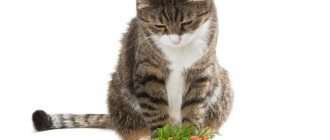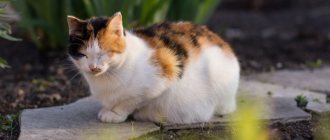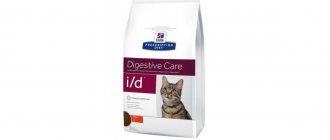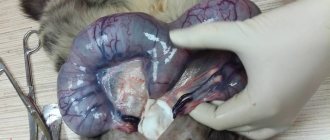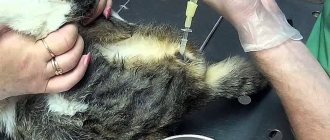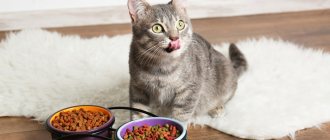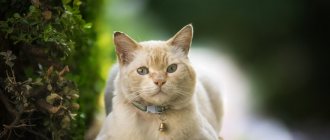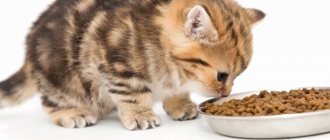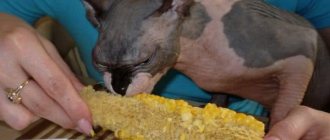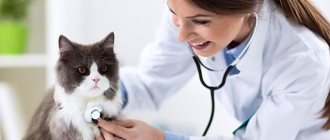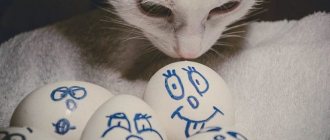Principles of feeding a pregnant pet
When compiling a diet for an expectant mother, it is necessary to follow the rule: food must be balanced and varied. Creating the same menu for the entire period of an animal’s interesting situation is not the best idea, because each period requires a review of the quantity and variety of food offered . But for the entire gestation period, food for pregnant cats must be of excellent quality, it must contain:
- Vitamins;
- Proteins;
- Minerals;
- Microelements.
Most often, from the first days of its placement, the animal’s appetite increases, and there is a need to have a snack between main meals. Take your time to increase the amount of food offered. It is better to do this gradually, avoiding overfeeding.
© shutterstock
Features of the diet at different stages of gestation
During the first two weeks, it is correct to feed a pregnant cat only 10 percent more than usual. It is important to remember that it is not the amount of feed that is increased, but the frequency of feedings . This will make it possible to reduce the risk of obesity in the animal, which can lead to a difficult birth. Don’t forget that your pet moves much less and sleeps more and more.
By the end of the first trimester, it is recommended that pregnant cats increase their diet by another 50 percent. Considering the individuality of each organism, it is worth listening to the needs of the cat; she herself will tell you how much and when she needs to eat.
Often, at the beginning of the last trimester, cats begin to eat little. This is due to the fact that there is less and less space left in the abdominal cavity for the usual volume of food, because the kittens are actively growing.
A few days before giving birth, caring owners worry that the cat has refused to eat at all. There is no need to worry, this is how her body reacts to the upcoming event.
Educational program on some elements
Folic acid. At the beginning of pregnancy (about a couple of weeks after mating) and before conception (at least 3 months), it is a good idea to give your cat folic acid. This connection is actively involved:
- in DNA synthesis and cell division;
- formation of the blood system in future offspring;
- formation of the neural tube and brain of the embryo.
Calcium and phosphorus. Experts also give recommendations on the use of calcium in the diet. Usually it is included only in the second half of pregnancy (by the way, it lasts on average 65 days), and 3 weeks before birth it is excluded from the cat’s menu.
- Excess calcium will provoke the growth of the skull bones and a lag in the development of already born kittens.
- Lack of calcium is the cause of eclampsia in a woman in labor (the appearance of convulsions, fever and even death) and puerperal fever.
As for phosphorus, this element is found in abundance in meat, so when selecting vitamin and mineral supplements, make sure that it is not there. Otherwise, you can get an imbalance in calcium-phosphorus metabolism.
It is believed that when feeding naturally, additional calcium must be included in the diet to balance out phosphorus: 100 g of meat product should contain 150 mg of calcium. It is better to give it in its natural form, for example, by grinding eggshells into powder.
But trying to feed a pregnant cat with calcium gluconate is a waste of time, since calcium is absorbed by the body only from the carbonate compound. For better absorption of the mineral component, you can use fish oil.
Protein is necessary for the formation of all tissues and is involved in milk production during lactation. With a lack of protein, the animal loses muscle mass.
Taurine is an amino acid. With its deficiency, miscarriage or death of the offspring occurs in the middle of pregnancy, and the birth of underdeveloped and sick kittens is possible.
Fatty acids, such as linoleic and arachidonic acids, are also important in maintaining pregnancy. If they are deficient, unborn offspring may die, and in the future the cat will become infertile.
Copper and iron are elements that must be present in the diet to prevent the development of anemia, but their excess will lead to constipation.
What to make the right diet from
The daily menu of a pregnant pet should be made up of various dishes and ingredients:
- Beef;
- Cottage cheese, kefir, curdled milk, yogurt (natural);
- Egg yolk;
- Boiled turkey and chicken meat;
- Carrots, cabbage, zucchini, cauliflower,
- Rice, buckwheat,
- By-products in small quantities.
A cat is unlikely to want to eat healthy vegetables. And here you can use a trick: grind the vegetables along with the meat in a blender. So, she will smell and taste the meat, but she will not be able to separate it from the vegetables.
© shutterstock
It is not recommended to introduce fish into the diet of pregnant cats. It does not matter whether it is raw or boiled.
If before pregnancy the animal ate ready-made food, then switching the cat to natural nutrition is not the best option. But it is better to replace the usual dry food with specialized food for pregnant women , and some owners buy kitten food for the expectant mother, which contains everything necessary for healthy offspring.
What to feed a British breed cat at home?
The British breed of shorthair cats belongs to the aristocrats of the animal world. This is a powerful, self-sufficient, intelligent and wonderful pet. Thanks to these properties, the British breed is suitable for owners who are not used to being at home all the time.
The pet easily tolerates loneliness and does not feel sad in the absence of its owners. They are not characterized by the habits inherent in ordinary representatives of the cat family. They make virtually no noise, as they have a quiet, pleasant voice, which they speak very rarely. Pets do not have the habit of sharpening their claws on upholstered furniture and do not ride on curtains trying to climb onto the ledge in search of adventure.
Many pet lovers know that purebred cats require special attention. In most cases, when purchasing a British cat from breeders, a person is given recommendations on what food is suitable for the animal. But what to do if the animal has already appeared, and its owners do not know what to feed a British breed cat at home. And with improper nutrition or a violation of the diet, irreparable changes in the health of the animal can occur.
Vitamins and vitamin supplements
If a pregnant animal eats ready-made food, there is no need to take additional vitamins, because they are contained in sufficient quantities in the food. But if the pet is fed natural food, it needs to receive vitamins for pregnant cats and minerals as complementary food.
On the issue of supplementary feeding with useful substances, the best thing to do would be to consult an experienced veterinarian.
He will ask you to tell us what you are currently feeding your pet, examine the state of her body, and only then will he be able to advise whether additional vitamins need to be given or whether this is not necessary.
A deficiency, as well as an excess of vitamins, cannot have a good effect on the condition of the animal. Therefore, it is not recommended to buy vitamins and various nutritional supplements for your animal yourself.
© shutterstock
General information about pregnancy
This interesting period of life is the same for Scottish and British favorites.
It lasts approximately sixty-five days. In the early stages, it is quite difficult to understand whether the cat is in a position, but there are still a certain number of points that can indicate this condition. At the very beginning of pregnancy, her activity decreases significantly, her appetite disappears and her nipples turn pink. The animal becomes more affectionate and gains significant weight. During this period, the pet needs excessive love, protection, attention and help. Throughout pregnancy, you need to pay attention to numerous points. For example, you need to make sure that the cat does not jump from a height. In addition, it would be best to protect the animal from communication with children during this entire time.
It is also important to ensure that your furry pet avoids hypothermia, drafts and all kinds of stressful situations, as they can only harm her during this period. If any alarming symptoms or ailments appear, you should immediately visit a veterinarian, who can recommend what to feed a pregnant Scottish or British cat in order to avoid such situations in the future.
Folk remedies for the health of the expectant mother and babies
To ensure that the animal has plenty of milk for the babies, in the second trimester, you can add boiled and crushed nettle leaves to the food. And to avoid the threat of premature miscarriage, as well as to facilitate childbirth, a good remedy is to drink raspberry leaves. The decoction is prepared as follows: for 200 ml of water, take 1 spoon of crushed leaves, which are brewed, filtered and cooled. During the entire period of pregnancy, pregnant cats are given a teaspoon before breakfast and dinner.
For constipation, oil-containing canned food, as well as vegetable purees with the addition of beet juice, seasoned with vegetable oil, help relieve the animal’s condition, as well as:
- Young wheat sprouts;
- Oats;
- Barley.
Probably everyone knows that it is better to feed a pregnant cat natural products, devoid of any “chemicals”. You can’t feed your pet unhealthy delicacies from the master’s table: sausages, sausages.
Features of postpartum feeding
Childbirth is quite a serious stress for the animal’s body. On the first day after them, the young mother can refuse to eat at all; there is no need to force her. But she must be provided with plenty of drink, and the liquid consumed must be nutritious.
Warm milk or low-fat meat broth made from beef or chicken would be a good option.
While feeding kittens with milk, the mother feels a lack of calcium, which can lead to a deterioration in the quality of the coat and twitching of the hind limbs. Sometimes, in especially severe cases, acute deficiency can lead to the death of the animal. To avoid such situations, it is worth seeing a veterinarian and, if necessary, receiving appropriate injections. Otherwise, a nursing cat has the same food as a pregnant cat.
© shutterstock
What foods should you feed your Briton at home?
Every pet owner should understand that purebred cats should never be fed food from the common table. If you decide to feed the animal only natural food, then you need to be patient and understand that you will have to cook separately for the Briton. An incorrect or unbalanced diet can negatively affect the health of a four-legged family member.
It is important to understand that not a single British cat can live without meat products . Previously, such food is exposed to low temperatures in the freezer compartment of the refrigerator, where the meat remains for at least two days. Thawed meat does not contain harmful microorganisms or bacteria and is therefore suitable for cats to eat raw. It is advisable to give preference to beef, which is cut together with films and veins. This meat can be given daily. It is better not to include veal in the food of a domestic cat, since it contains virtually no enzymatic substances.
When feeding an animal lamb, pork or game, they must be subjected to heat treatment. Otherwise, helminths or much more serious parasites may appear in the cat’s body. The British also like offal - kidneys, liver, heart or lungs, cut into pieces. Such a meat product cannot be cut very finely so that the pet does not swallow it, practically without chewing. Liver can only be used from beef or chicken, and never from pork.
Boiled fish is beneficial for the health of a British cat. Eating raw fish is undesirable due to the fact that it destroys B vitamins in the body. It is advisable to use marine varieties of fish. But it is impossible for fish to take up a large part of the animal’s food. A castrated animal can be given fish no more than once a month. Chicken meat must first be boiled and bones removed from it, if any. It is better to give it together with broth no more than 3-5 times a week.
The British food can consist of chicken and quail yolks , both boiled and raw. You can mix egg yolk with dairy products and give it to your pet 2-3 times a week. Whole eggs can be cooked like an omelet without adding spices or salt and can also be given to a British cat. Separately, the animal can be fed with fermented milk products. However, veterinarians do not recommend giving milk in its pure form.
We recommend reading: Thick Fabric For Scratching Post
Nutritional features of pregnant purebred cats
The gestation period for Scottish Fold and British pets lasts about 65 days. During this period, the animal must receive everything it needs with food, so the food must be of high quality, high-calorie and nutritious. It is optimal to divide your daily diet into five or six meals . Thus, it will be possible to avoid overfeeding, and thereby ease the difficult moment of childbirth.
A complex of strengthening components, including:
- Calcium;
- Magnesium;
- Iodine;
- Potassium;
- Zinc;
- Sodium;
- Iron;
- Vitamins A, D, C, B, E.
Taurine occupies an important place in the rational nutrition of purebred pets. The substance helps prevent the appearance of defects in babies while still in the womb. Amino acids help strengthen the heart, and are also a good preventative against indigestion.
What is forbidden to give
Regardless of the breed, you need to remember that for the birth of healthy offspring there are a number of drugs that should absolutely not be given during pregnancy. These substances include various medications and anthelmintic drugs. In addition, vaccinations, antibiotics, hormones, and aggressive medications for fleas or other parasites are excluded.
© shutterstock
In case of urgent need to treat for any disease, an experienced veterinarian will prescribe the most gentle treatment possible.
